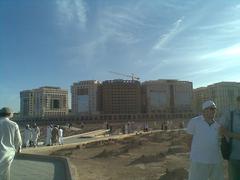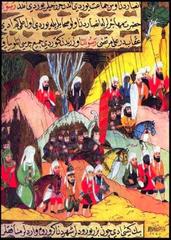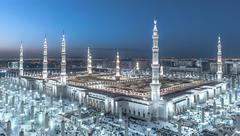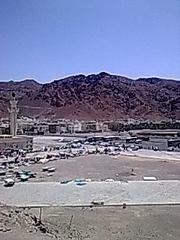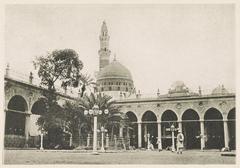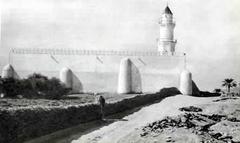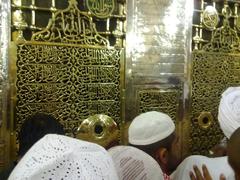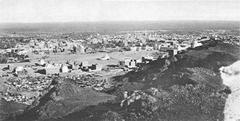As-Sajadah Mosque Visiting Hours, Tickets, and Medina Historical Sites Guide
Date: 04/07/2025
Introduction
As-Sajadah Mosque, also known as Masjid as-Sajadah, Asy-Syukr Mosque, or Abi Dzar Mosque, is a revered religious and historical landmark located in Medina, Saudi Arabia. Just 900 meters north of the Prophet’s Mosque (Al-Masjid an-Nabawi), As-Sajadah Mosque commemorates the site where Prophet Muhammad (peace be upon him) performed a significant prostration of gratitude (sajdah) after receiving divine revelation. Its tranquil atmosphere and spiritual significance make it a meaningful destination for pilgrims and visitors interested in Medina’s rich Islamic heritage. This guide provides detailed information on the mosque’s historical importance, architectural features, visiting hours, ticketing, travel tips, accessibility, etiquette, and nearby attractions to help you plan a respectful and enriching visit.
For more on Medina’s historical sites and the mosque’s spiritual importance, consult resources such as Wikipedia: The Seven Mosques and Saudi Arabia ABC: Medina.
Historical and Religious Significance
As-Sajadah Mosque marks the location where Prophet Muhammad performed a special prostration of gratitude upon receiving glad tidings from Angel Gabriel regarding the acceptance of prayers for his followers. This deeply spiritual act inspired the mosque’s name—“sajadah” meaning prostration in Arabic—and makes it a symbol of humility and thankfulness in the Islamic tradition. The mosque dates back to the early Islamic period and has undergone several renovations, notably during the Ottoman era and more recently by the Saudi government, reflecting its enduring religious and historical value (Wikipedia).
Architectural Features
Layout and Design
As-Sajadah Mosque showcases the traditional hypostyle layout common in early Islamic architecture, with a rectangular prayer hall supported by columns facing the qibla wall (direction of prayer). A mihrab marks the direction of Mecca, and a sahn (courtyard) provides open-air space for worshippers. The mosque’s entrances are crafted from fine woods and adorned with intricate carvings, echoing the reverence for sacred spaces in Medina (Gulf News).
Materials and Decorative Elements
Robust columns made of local stone or reinforced concrete, flat roofs for climate control, and carefully integrated natural lighting create a serene worship environment. The mosque’s interior features Quranic calligraphy, geometric patterns, and a subdued color palette, all emblematic of Islamic art and architecture (Social Science Journal; Scribd).
Minaret and Community Role
A slender minaret allows the call to prayer (adhan) to reach the surrounding neighborhood, reinforcing the mosque’s role as a community hub (World History Edu).
Recent Renovations and Modern Enhancements
The Saudi government has recently enhanced the mosque’s structure and visitor facilities while preserving its historical character. Key improvements include:
- Structural Reinforcements: Upgrades to foundations, columns, and roof for safety and longevity.
- Accessibility: Ramps, level pathways, and basic facilities for wheelchair users and the elderly.
- Environmental Controls: Modern air conditioning, shading devices, and energy-efficient lighting.
- Sanitation: Enhanced ablution areas and restroom facilities.
- Digital Enhancements: Multilingual signage, Wi-Fi, and improved audio-visual systems.
- Security: Surveillance cameras and modern fire safety systems.
- Heritage Preservation: Restoration of original stonework, wood carvings, and calligraphy.
(Gulf News; World History Edu)
Visitor Information
Location and Accessibility
The mosque is centrally located on Abi Dzar Street, about a 10–15 minute walk from Al-Masjid an-Nabawi. Taxis, ride-hailing services, and public transport provide convenient access (Trek Zone; Kosupa Travel).
Accessibility for All
While recent renovations have improved access for wheelchair users, facilities may not be as extensive as those at larger mosques. Visitors with mobility needs should plan accordingly.
Visiting Hours and Entry
- Hours: Open daily for the five prayers, from dawn (Fajr) until after night (Isha) prayer. Hours may vary during Ramadan and holidays.
- Entry Fee: Free for all Muslim visitors; voluntary donations are welcome.
- Non-Muslim Access: Non-Muslims are generally not permitted to enter but may view the mosque from outside (Medina Hotels; Kosupa Travel).
Best Times to Visit
Early mornings or late evenings provide a quieter, more reflective atmosphere, especially outside peak prayer times. Fridays and Ramadan see larger crowds.
Dress Code and Etiquette
- Men: Wear long trousers and sleeved shirts; shorts and sleeveless tops are discouraged.
- Women: Modest clothing covering arms and legs; a headscarf is required. An abaya is recommended but not mandatory for tourists (Travel Insighter).
- Footwear: Remove shoes before entering the prayer hall; a bag for shoes is useful.
- Behavior: Maintain a respectful silence, avoid loud conversations, and follow traditional supplications when entering and exiting (Soul of Saudi).
- Photography: Permitted outside; avoid photographing worshippers, especially during prayers (Gulf News; Kosupa Travel).
Facilities and Amenities
- Clean ablution (wudu) areas and restrooms, though smaller than those at major mosques.
- Separate, air-conditioned prayer halls for men and women.
- Shoe racks and shaded seating nearby.
- No food or drink inside the mosque, except water bottles which should be properly disposed of.
Safety and Security
Security personnel are present, especially during peak times and religious holidays. Arrive early on Fridays and during Ramadan to avoid congestion.
Guided Tours and Special Events
Many local operators include As-Sajadah Mosque in religious and historical tours, which offer in-depth context. During Ramadan and other Islamic months, the mosque hosts extended prayers and spiritual lectures (TripXL).
Nearby Attractions
Enhance your visit by exploring these nearby sites:
- Al-Masjid an-Nabawi: The Prophet’s Mosque, a major pilgrimage site.
- Quba Mosque: The first mosque in Islamic history.
- Qiblatain Mosque: Known for the revelation of the change in prayer direction.
- Seven Mosques Complex: Historically significant smaller mosques (Besides the Obvious).
- Al-Baqi’ Cemetery & Hejaz Railway Museum: Additional historical sites within walking distance.
FAQ: Frequently Asked Questions
Q: What are the visiting hours of As-Sajadah Mosque?
A: Open daily from dawn to after night prayers; hours may vary during religious occasions.
Q: Is there an entry fee or ticket required?
A: No, admission is free.
Q: Can non-Muslims visit As-Sajadah Mosque?
A: Non-Muslims are not permitted inside but can view the mosque’s exterior.
Q: Are guided tours available?
A: Yes, many guided tours of Medina’s sacred sites include the mosque.
Q: Is the mosque wheelchair accessible?
A: Yes, though assistance may be required for certain areas.
Practical Tips for Visitors
- Plan around prayer times to avoid crowds.
- Stay hydrated, especially in Medina’s hot climate.
- Respect local customs—dress codes and mosque etiquette apply inside and out.
- Use language apps or phrasebooks if needed; English signage is available in some areas.
- Keep emergency contacts and accommodation details with you.
For Women
- Use designated entrances and prayer areas; ask staff for guidance.
- Visit during daylight hours and avoid visiting alone at night.
- Female staff may be available to assist.
Visual Media Recommendations
Capture the mosque’s exterior and courtyard, and use virtual tours to explore before or after your visit. High-quality photos with descriptive alt tags such as “As-Sajadah Mosque Medina entrance” enhance the online visitor experience.
Conclusion
As-Sajadah Mosque stands as a testament to Medina’s rich spiritual and historical legacy. Its serene environment, free entry, and proximity to other major Islamic sites make it a must-visit destination for those seeking a meaningful connection to Islamic history. By respecting the mosque’s traditions and etiquette, visitors can enjoy a fulfilling and respectful journey.
Plan your visit today, download the Audiala app for real-time updates, and follow us on social media for more insights into Medina’s sacred sites and cultural heritage.
References & External Resources
- Wikipedia: The Seven Mosques
- Saudi Arabia ABC: Medina
- Medina Hotels: A Comprehensive Medina Saudi Arabia Travel Guide
- Soul of Saudi: Prophet’s Mosque Etiquette Guidelines
- Trek Zone: As-Sajadah Mosque Medina
- Besides the Obvious: The Seven Mosques in Medina
- TripXL: Medina Mosque
- Gulf News: Teak, Gold and Reverence
- Kosupa Travel: Can Non-Muslims Visit Medina?
- Travel Insighter: Visiting Saudi Arabia
- Social Science Journal
- Scribd: Architecture of the Mosque at Medina
- World History Edu
For more articles:
